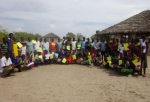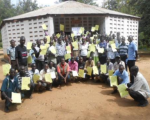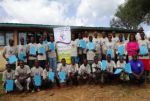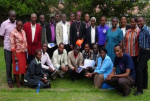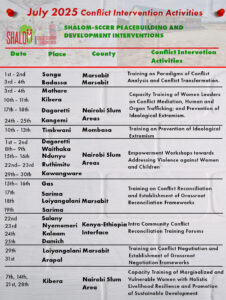By Paulson Erot
Shalom Center for Conflict Resolution and Reconciliation is and has been in the forefront of working towards ending the cycle of violence that has persisted in the tribal lands of Eastern Africa. In order to achieve this overall goal, Shalom has focused in tackling the underlying root causes of conflict as opposed to the traditional approaches of ‘treating’ the symptoms of the conflict.
Since its inception in 2009, Shalom has been working with key influential opinion shapers that form consistent working community groups in Turkana, West Pokot, Samburu, Marsabit, Isiolo, Nairobi and Nakuru counties, as well as the southern parts of South Sudan and Ethiopia. These community groups are made up of the local administrators (chiefs, police, district peace committee members & Kenya police reservists); religious leaders (priests, pastors, catechists & Catholic Justice and Peace Committee members); women leaders; youth leaders; teachers; and other relevant duty bearers. These categories of persons have major influence both at the middle and at the grassroots levels of the society. If peace has to be activated and promoted, they are the ones to proactively nurture it since they are frequently in contact with the two levels in the pyramid of society.
Shalom equips these opinion shapers with the knowledge and skills of conflict prevention, management, resolution and transformation through intensive trainings throughout the year. After acquiring these analytical skills and peace techniques, they devise innovative and creative interventions to manage and resolve conflicts in their own communities. They have, therefore, become the agents of positive change, voice of reasoning, peace ambassadors, and ‘peace cultivators and promoters’ in their various communities.
So far, SCCRR has formed and engaged 24 consistent and working community groups made up of 956 key influential opinion shapers in six counties in Kenya: Turkana, West Pokot, Samburu, Marsabit, Nairobi and Nakuru. These groups have continued to promote the culture of peace and tolerance among the members of their various ethnic communities.
The following are some of the major impacts (tangible initiatives and interventions) by Shalom’s Community Groups so far:
- Trust building and community dialogue meeting held in Eldoret between the selected representatives drawn from both the Turkana and Pokot communities
- Conducted 19 intra-cohesion activities and 15 inter-cohesion activities reaching out to 2018 and 2236 indirect beneficiaries respectively
- Engaged warriors and (reformed) cattle rustlers in advocating for peace in Turkana, West Pokot and Samburu communities
- Initiated sporting activities between the Turkana and the Pokot communities, and the Turkana and the Merille ethnic groups
- Initiated Peace Clubs in schools in Turkana, West Pokot and Samburu Counties;
- Contributed to the reduction in ethnic conflict related deaths between the Turkana and the Merille ethnic communities in Todonyang’ in Turkana County
- Spearheaded the drawing of a communal agreement on the grazing and fishing grounds between the Turkana and the Merille ethnic groups in Todonyang’
- Contributed to the emergence of tolerance between the Kikuyu and Luo ethnic groups, and the reduction of landlords-tenants tensions and institutional neglect in Kibera;
- Led to the revival of inter-ethnic markets in Nakuru County; and the reduction of confrontations between County Council and the hawkers in Nakuru town
Shalom will continue to engage and work with key influential opinion shapers in conflict-prone communities by enhancing their capacities so that they are part of the long-term solution to the prevention, management, resolution and transformation of various conflicts in their own communities. SCCRR is committed to this task until it attains its overall goal of “Working to End the Cycle of Violence in the Tribal Lands of Eastern Africa.”
- Todonyang’Community Leaders Group in Turkana County
- Lomut Community Leaders Group in West Pokot County
- Morijo Community Leaders Group in Samburu County
- Maikona Community Leaders Group in Marsabit County
- Kibera Community Leaders Group in Nairobi County
- Nakuru Town CJPC Members Group in Nakuru County

